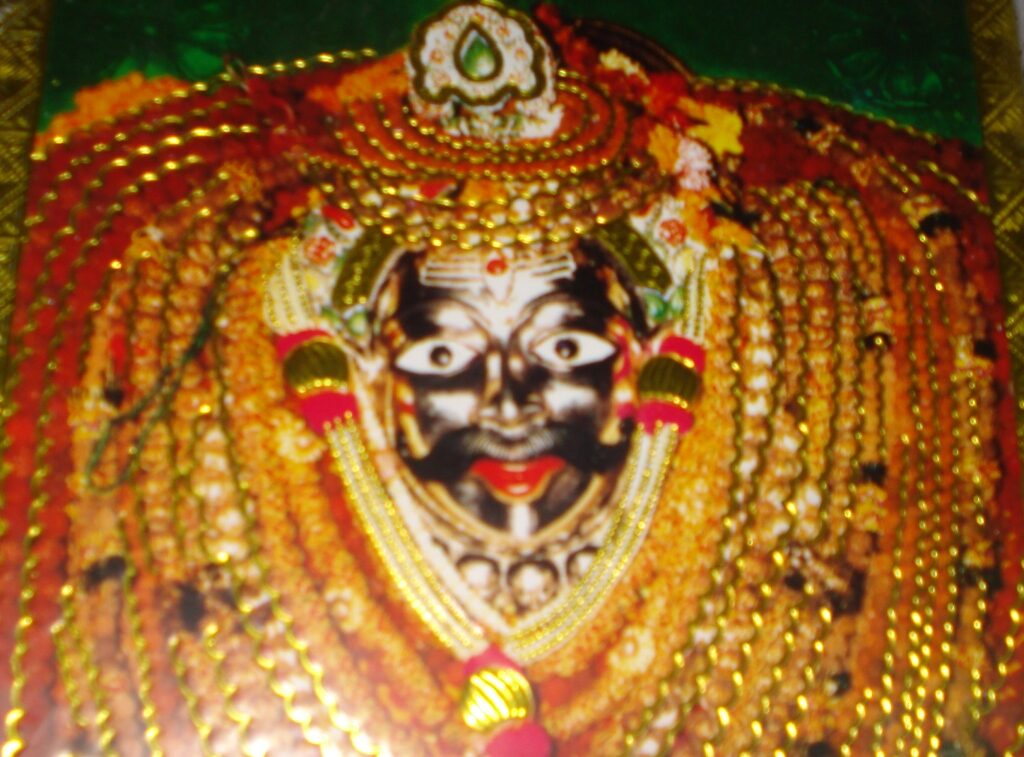KAAL BHAIRAV
Long time back several great Sages sitting atop Sumeru Mountain desired to know from Lord Brahma as to who was indestructible and supreme. Lord Brahma proclaimed himself to be that superior person. On hearing this, Yagyeshwar (symbolic of Narayan) reprimanded Lord Brahma for his hasty and audacious utterances.
Both of them asked the same question to the four Vedas. Rig Veda replied that the omnipotent deity who controls all living beings, named Rudra is supreme. Yajur Veda replied that He, whom we worship through various Yagnas (Yagam) and other such rigorous rituals, is none other than Shiva, who is supreme. Sam Veda stated that the respected figure who is worshipped by various Yogis and that Person who controls the entire world is none other than Triambakam. Finally, Atharva Veda said, all human beings can see the Lord through Bhakti Marg and such a deity who can remove all the worries of human beings is indeed Shankar. In a nut shell, all the four Vedas proclaimed that Lord Shiva is the ultimate being.
Both Lord Brahma and Yagya Narayan started laughing in disbelief. Shortly Lord Shiva appeared as a powerful divine light in their midst. Lord Brahma stared at that Being furiously with his fifth head. Lord Shiva immediately created one living being and stated that he (the new being) will be King of Kaal and will be known as Kaal Bhairav. (Here Kaal is denoted to mean the final time viz. death). Lord Shiva further stated Kaal Bhairav will always be in Kashi, removing all sins of the devotees and therefore, he will be known as Paap Bhakshak.

(KAAL BHAIRAV)
Meanwhile, Lord Brahma’s fifth head was still burning with fury and Kaal Bhairav plucked that head (just as we pluck flowers from the garden). Immediately all the people present there started singing praises of Lord Shiva. Lord Shiva directed Bhairav to go around various places but Brahma Hatya Dosh (affliction on account of hurting a Brahmin) will always follow him. Lord Shiva created a dangerous and fierce looking female figure, named Brahma Hatya and asked her to follow Kaal Bhairav wherever he went.
Kaal Bhairav, with Brahma’s head in his hand, started going around various places in the world, took bath in various Teerths, worshipped various Lords, nevertheless saw that Brahma Hatya was following him all along. He could not get rid of that affliction.
Finally, Kaal Bhairav reached the Moksha Puri, Kashi. The moment Kaal Bhairav entered Kashi, Brahma Hatya started shouting, screaming and finally disappeared into the netherworld. The head of Brahma, (Kapal) fell at a place which was called Kapal Mochan and there was a Teerth which was later called Kapal Mochan Teerth. Then onwards Kaal Bhairav stationed himself permanently in Kashi, giving shelter to all his devotees. Those living in or visiting Kashi, must worship Kaal Bhairav and he grants protection to all his devotees.
Ashtami day (eighth day after Poornima) in the month of Margashirsha is an important day for worshipping Kaal Bhairav. Besides, Sundays, Tuesdays, Ashtami and Chaturdasi days are very important for worshipping Kaal Bhairav.
——————————————————————————————————-
Kashi Khand, Chapter 31, Shlok 146
कृत्वा च विविधां पूजां महासम्भारविस्तरै:
नरो मार्गाऽसिताऽष्टंम्यां वार्षिकं विघ्नमुत्सृजेत
On the Krishna Ashtami date (Kaal Bhairav Jayanti) of Margashirsha (Agahan) month, a devotee who performs various pujas (of Kaal Bhairav) with all pooja materials, his obstacles/troubles for the whole year are removed.
———————————————————————————————————
A person who circumabulates Lord Kaal Bhairav eight times will be absolved of all the sins committed by him. A devotee who worships Kaal Bhairav for six months will attain all types of Siddhi. (Kashi Khand, Chapter 31).
——————————————————————————————————-
Kashi Khand, Chapter 31, Shlok 147
अष्टम्यां च चतुर्दश्यां रविभूमिजवासरे
यात्रां च भैरवीं कृत्वा कृतै: पापै: प्रमुच्यते
If a devotee worships Kaal Bhairav on Sundays or Tuesdays as also on Ashtami and Chaturdasi days, he will get relief from all sins committed.
———————————————————————————————————
Old timers in Kashi believe whenever residents of Kashi leave the city for short journeys, they worship Kaal Bhairav (taking his permission) and on return back to Kashi, they again worship Kaal Bhairav.
LOCATION OF KAAL BHAIRAV
Kaal Bhairav is located at K-32/22, Bhaironath. People can approach this place by rickshaw either through Bisheshwarganj cross roads or through Golghar (Maidagin). This is a very famous temple and devotees will be guided by the local residents.
Please watch our YouTube Video about Kaal Bhairav at following Link
https://www.youtube.com/watch?v=0T5SMXRgQQs&t=11s
TYPES OF POOJA
The temple remains open from 05.00 a.m. to 1.30 p.m. and from 04.30 p.m. to 09.30 p.m. There is heavy rush of devotees on Sundays and Tuesdays.


